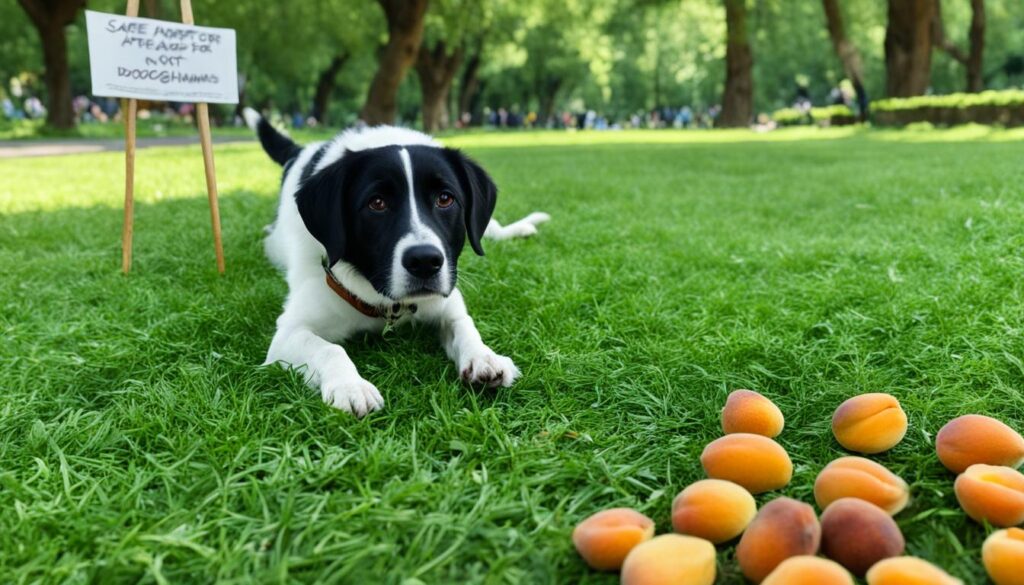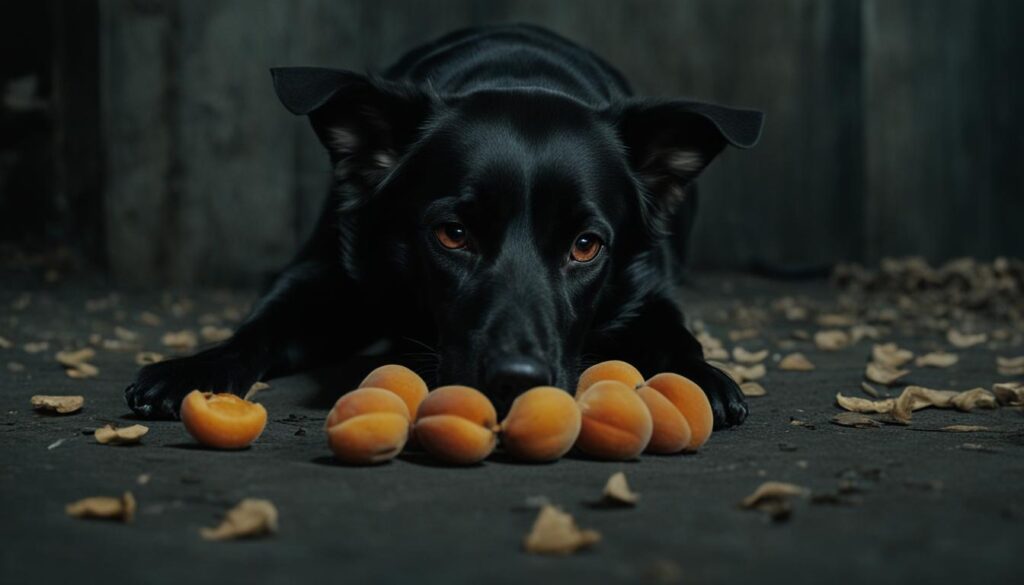I’m often asked about the safety of feeding dried fruits to dogs, and specifically, whether dogs can eat dried apricots. As a professional copywriting journalist, I’ve done extensive research on this topic to provide you with accurate and essential information.
Firstly, it’s essential to understand that dogs can indeed eat dried apricots, but there are a few precautions you should take to ensure their safety. Dried apricots, like other dried fruits, can be a healthy addition to a dog’s diet when fed in moderation.
Key Takeaways:
- Dogs can eat dried apricots in moderation, but it’s important to remove the seeds, pit, leaves, and stem as they contain cyanide, which is toxic to dogs.
- Dried apricots can provide vitamins, minerals, and antioxidants beneficial to your dog’s health.
- Always check the label for added sugars or harmful additives before feeding dried apricots to your dog.
- Monitor your dog’s consumption of dried apricots and be aware of the potential risks, including gastrointestinal issues and cyanide poisoning if the toxic parts are ingested.
- Consult with your veterinarian for personalized feeding recommendations and to address any concerns about your dog’s diet.
Are Apricots Safe for Dogs?

Apricots can be safe for dogs to eat, as they contain vitamins, minerals, and antioxidants that can benefit their health. However, it’s important to avoid feeding dogs the seeds, pit, leaves, or stem of the apricot as these parts contain cyanide, which is toxic to dogs. Cyanide poisoning can lead to serious symptoms and even death in dogs. It’s essential to understand the potential risks and ensure that your dog only consumes the flesh of the apricot in moderation.
Dogs can enjoy the nutritional benefits of apricots, but it’s crucial to exercise caution and prioritize their well-being. The flesh of apricots contains essential nutrients that can support dog health, including Vitamins A, C, and E, as well as dietary fiber. These nutrients can promote immune function, improve skin and coat health, and aid in digestion.
However, it’s crucial to prevent your dog from ingesting the toxic parts of the apricot, such as the seeds, pit, leaves, and stem. These parts contain cyanide, a harmful substance that can have severe health consequences for dogs. Cyanide poisoning can manifest in symptoms such as shortness of breath, increased heart rate, vomiting, fatigue, seizures, and even death.
“It’s always best to err on the side of caution when it comes to feeding our furry friends. While apricots can provide nutritional benefits, it’s vital to remove any potentially harmful parts to prevent cyanide poisoning in dogs.”
To keep your dog safe, always remove the seeds, pit, leaves, and stem before offering apricots as a treat. Limit the amount of apricot flesh you give to your dog, as excessive consumption can still lead to gastrointestinal issues due to the fruit’s natural sugars and fiber content.
Feeding dried apricots to dogs requires additional caution. While the drying process removes the toxic elements found in the fresh fruit, it concentrates the nutrients and sugars. As a result, dried apricots can be high in sugar and should be given sparingly.
Benefits of Apricots for Dog Health
When fed in moderation, apricots can provide various health benefits to dogs. Here are some of the potential advantages:
- Antioxidants: Apricots are rich in antioxidants that can help combat free radicals and promote overall health and longevity.
- Vitamins and Minerals: Apricots contain vitamins A, C, and E, as well as potassium, which are essential for maintaining proper bodily functions and supporting a strong immune system.
- Fiber: The fiber in apricots aids digestion and can help regulate bowel movements in dogs.
It’s important to note that every dog is unique, and some may have specific dietary restrictions or sensitivities. Always consult with your veterinarian before introducing apricots or any new food into your dog’s diet. They can provide personalized advice based on your dog’s individual needs and health conditions.
Can Dogs Eat Dried Apricots?
Dried apricots can be a tempting treat for dogs, but it’s important to understand how to incorporate them into their diet safely. While dogs can eat dried apricots, it’s crucial to feed them in moderation and be aware of potential risks.
Dried apricots are typically de-stoned, meaning they do not contain the toxic parts of the apricot such as the seeds, pit, leaves, or stem. This makes them a dog-friendly option when it comes to dried fruits. However, it’s essential to remember that dried apricots are concentrated in nutrients and can be high in sugar.
When giving dried apricots to your dog, it’s vital to limit the amount provided. Too many dried apricots can cause gastrointestinal issues due to their high sugar content. Additionally, some brands may add sugars or other additives that can be harmful to dogs. Always check the label before feeding dried apricots to your furry friend.
In summary, while dogs can enjoy the occasional dried apricot as a treat, it’s crucial to feed them in moderation and be cautious of added sugars and potential gastrointestinal issues. As with any new food, it’s always a good idea to consult with your veterinarian before introducing dried apricots or any other new food into your dog’s diet.
Potential Risks of Dried Apricots for Dogs

While dried apricots can be safe for dogs in moderation, it’s important to be aware of the potential risks that they can pose to your furry friend. Although dried apricots are concentrated in nutrients and can provide certain health benefits, they also come with certain considerations when it comes to your dog’s well-being.
Gastrointestinal Issues
Dried apricots are high in fiber and can be beneficial for your dog’s digestive system when consumed in small amounts. However, feeding your dog excessive quantities of dried apricots can result in gastrointestinal issues, such as diarrhea. It’s important to monitor your dog’s intake and ensure that you only provide them with dried apricots as an occasional treat.
Added Sugars
Some dried apricots may contain added sugars or other additives that can be harmful to dogs. These additives can lead to weight gain, dental problems, and even diabetes in dogs. Before offering dried apricots to your pup, always check the label for any added sugars or other potentially harmful ingredients.
Cyanide Poisoning
One of the greatest concerns when it comes to dried apricots and dogs is the risk of cyanide poisoning. While the flesh of the apricot itself is safe for dogs to consume, the pits or seeds of apricots contain cyanide, which is toxic to dogs. If your dog manages to eat dried apricots with the pits or seeds, it can lead to serious health issues or even be fatal. It’s crucial to ensure that your dog does not have access to dried apricots with intact pits or seeds.
Monitoring and Moderation
To minimize the potential risks associated with dried apricots for dogs, it’s important to monitor your dog’s consumption and provide them with dried apricots as an occasional and controlled treat. Always opt for dried apricots that have been properly de-stoned to eliminate any risk of cyanide poisoning. Additionally, consulting with your veterinarian for personalized dietary guidance specific to your dog’s needs is highly recommended.
By understanding and addressing the potential risks, you can safely incorporate dried apricots into your dog’s diet while ensuring their overall well-being and health.
Including Dried Apricots in Your Dog’s Diet

If you choose to include dried apricots in your dog’s diet, it’s important to do so responsibly. Start by cutting the dried apricots into small, bite-sized pieces to prevent choking and to make it easier for your dog to digest. Only offer dried apricots as an occasional treat and be mindful of the amount due to their concentrated nutrient content. It’s also crucial to check the label for any added sugars or other additives that may be harmful to your dog. Always consult with your veterinarian before making any significant changes to your dog’s diet.
If you choose to include dried apricots in your dog’s diet, it’s important to do so responsibly. Start by cutting the dried apricots into small, bite-sized pieces to prevent choking and to make it easier for your dog to digest. Only offer dried apricots as an occasional treat and be mindful of the amount due to their concentrated nutrient content. It’s also crucial to check the label for any added sugars or other additives that may be harmful to your dog. Always consult with your veterinarian before making any significant changes to your dog’s diet.
- Cut dried apricots into small, bite-sized pieces to prevent choking
- Offer dried apricots as an occasional treat
- Be mindful of the amount due to concentrated nutrients
- Check the label for added sugars or harmful additives
- Consult with your veterinarian before making any diet changes
“Including dried apricots in your dog’s diet can provide a tasty and nutritious treat. However, it’s important to exercise caution and moderation to ensure your dog’s health and well-being.”
| Benefits of Including Dried Apricots in Your Dog’s Diet | Potential Risks of Including Dried Apricots in Your Dog’s Diet |
|---|---|
|
|
Apricots and Other Dog-Friendly Fruits

Apricots are just one example of dog-friendly fruits that can be included in their diet. Other safe dried fruits for dogs include apples, bananas, blueberries, and cranberries. These fruits also provide vitamins, minerals, and antioxidants that can benefit your dog’s health.
Like dried apricots, it’s important to feed these fruits in moderation and check for any added sugars or other harmful additives. Always introduce new fruits gradually and monitor your dog for any adverse reactions.
| Fruit | Nutritional Benefits |
|---|---|
| Apples | High in fiber, vitamin C, and antioxidants |
| Bananas | Rich in potassium, vitamin B6, and fiber |
| Blueberries | Packed with antioxidants and vitamin C |
| Cranberries | Contain antioxidants and can support urinary tract health |
Just like with dried apricots, it’s important to remember that these fruits should be given in moderation as part of a balanced diet. Monitor your dog’s response to these fruits and consult with your veterinarian if you have any concerns.
Treating Cyanide Poisoning from Apricots
If you suspect your dog has ingested apricot seeds or shows symptoms of cyanide poisoning, immediate medical attention is necessary. Cyanide poisoning can be a life-threatening condition for dogs, and prompt treatment is crucial for their recovery. Contact your veterinarian or the Pet Poison Helpline® at (855) 764-7661 for guidance and immediate assistance.
The treatment for cyanide poisoning in dogs may involve using activated charcoal, which is a substance that helps absorb and expel the poison from the dog’s stomach. Activated charcoal can help reduce the absorption of cyanide into the bloodstream, limiting its toxic effects on the body.
Additionally, veterinary professionals may administer oxygen therapy to ensure that the dog receives sufficient oxygen, and intravenous fluids may be given to maintain hydration and support kidney function.
The recovery of your dog will depend on various factors, including their overall health condition and the promptness of the treatment. It’s important to follow your veterinarian’s instructions and monitor your dog closely during their recovery process.
Signs of Cyanide Poisoning in Dogs
Recognizing the signs of cyanide poisoning in dogs can help you take immediate action and seek the necessary veterinary care. The symptoms of cyanide poisoning may include:
- Shortness of breath
- Increased heart rate
- Vomiting
- Seizures
- Loss of consciousness
If you notice any of these symptoms or suspect your dog has ingested apricot seeds, contact your veterinarian immediately for a proper diagnosis and treatment.
Training Your Dog to Avoid Apricots

To prevent your dog from ingesting apricots and encountering the risk of apricot toxicity, it’s important to train them to avoid these fruits. Establish clear guidelines about when and what your dog can eat, and ensure consistency among all family members and visitors. Train your dog to only accept treats from you and to stay out of the kitchen or any area where apricots are stored. Crate training can also help prevent accidental ingestion of harmful foods while you’re away. Consistency and proper training are key to keeping your dog safe from apricot toxicity.
Signs of Apricot Poisoning in Dogs

Dogs that consume apricot seeds or other toxic parts of the apricot may experience apricot poisoning, which can lead to severe symptoms. It is essential to be aware of the signs of apricot poisoning in dogs to ensure their well-being. Some common symptoms of apricot toxicity in dogs include:
- Shortness of breath
- Increased heart rate
- Vomiting
- Fatigue
- Dilated pupils
- Bright red gums
- Seizures
- Loss of consciousness
- Sudden death
If you notice any of these symptoms in your dog or suspect that they have ingested apricot seeds, pits, or other toxic parts, it is crucial to seek immediate veterinary attention. Swift medical intervention can make a significant difference in your dog’s outcome.
Monitoring your dog’s well-being and being familiar with these signs can help you identify apricot poisoning and take the necessary steps to protect your dog’s health.
Wrapping Up
In conclusion, it is safe for dogs to eat dried apricots, but caution must be exercised. While the flesh of the apricot is beneficial for dogs as it contains vitamins, minerals, and antioxidants, the seeds, pit, leaves, and stem of the apricot are toxic due to the presence of cyanide. It is essential to remove these parts before offering dried apricots to your furry friend.
Feeding dried apricots in moderation is crucial due to their concentrated nutrient content and high sugar levels. Some dried apricots may also have added sugars or harmful additives, so it’s important to check the label before giving them to your dog. Additionally, if your dog ingests the seeds or shows symptoms of cyanide poisoning, immediate veterinary attention is necessary.
Always prioritize your dog’s safety and consult with your veterinarian for personalized feeding recommendations. Remember to train your dog to avoid apricots and other potentially harmful foods to prevent accidental ingestion. By understanding the potential risks and taking necessary precautions, you can ensure the well-being of your beloved canine companion.
FAQ
Can dogs eat dried apricots?
Yes, dogs can eat dried apricots. However, it’s important to feed them in moderation and with caution.
Are apricots safe for dogs?
Apricots can be safe for dogs to eat, but it’s important to remove the seeds, pit, leaves, and stem as they contain cyanide, which is toxic to dogs.
What are the potential risks of dried apricots for dogs?
The potential risks of dried apricots for dogs include gastrointestinal issues from high sugar content and the possibility of cyanide poisoning if the dog ingests the seeds or pit.
Can dogs eat other dried fruits besides apricots?
Yes, there are other safe dried fruits for dogs, such as apples, bananas, blueberries, and cranberries. These fruits should also be fed in moderation.
How should I include dried apricots in my dog’s diet?
Dried apricots should be cut into small, bite-sized pieces and offered as an occasional treat. Consult with your veterinarian for personalized feeding recommendations.
What should I do if my dog ingests apricot seeds or shows symptoms of cyanide poisoning?
Immediate veterinary attention is necessary. Contact your veterinarian or Pet Poison Helpline® at (855) 764-7661 for guidance.
How can I train my dog to avoid apricots?
Establish clear guidelines about what your dog can eat and train them to stay away from areas where apricots are stored. Consistency and crate training can help prevent accidental ingestion.
What are the signs of apricot poisoning in dogs?
Signs of apricot poisoning in dogs can include shortness of breath, increased heart rate, vomiting, seizures, dilated pupils, and sudden death.
Is it safe to feed my dog dried apricots with added sugars or other additives?
It’s important to check the label for any added sugars or harmful additives before feeding dried apricots to your dog. It’s best to avoid such products.
Can I include other dog-friendly fruits in my dog’s diet?
Yes, besides dried apricots, other safe fruits for dogs include apples, bananas, blueberries, and cranberries. Introduce new fruits gradually and monitor your dog for any adverse reactions.






